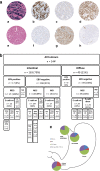Gastric cancer: immunohistochemical classification of molecular subtypes and their association with clinicopathological characteristics
- PMID: 29046940
- PMCID: PMC5886993
- DOI: 10.1007/s00428-017-2240-x
Gastric cancer: immunohistochemical classification of molecular subtypes and their association with clinicopathological characteristics
Abstract
Gastric cancer is traditionally divided into intestinal and diffuse histological subtypes, but recent molecular analyses have led to novel classification proposals based on genomic alterations. While the intestinal- and diffuse-type tumours are distinguishable from each other at the molecular level, intestinal-type tumours have more diverse molecular profile. The technology required for comprehensive molecular analysis is expensive and not applicable for routine clinical diagnostics. In this study, we have used immunohistochemistry and in situ hybridisation in molecular classification of gastric adenocarcinomas with an emphasis on the intestinal subtype. A tissue microarray consisting of 244 gastric adenocarcinomas was constructed, and the tumours were divided into four subgroups based on the presence of Epstein-Barr virus, TP53 aberrations and microsatellite instability. The intestinal- and diffuse-type tumours were separately examined. The distribution of EGFR and HER2 gene amplifications was studied in the intestinal-type tumours. Epstein-Barr virus positive intestinal-type tumours were more common in male patients (p = 0.035) and most often found in the gastric corpus (p = 0.011). The majority of the intestinal-type tumours with TP53 aberrations were proximally located (p = 0.010). All tumours with microsatellite instability showed intestinal-type histology (p = 0.017) and were associated with increased overall survival both in the univariate (p = 0.040) and multivariate analysis (p = 0.015). In conclusion, this study shows that gastric adenocarcinomas can be classified into biologically and clinically different subgroups by using a simple method also applicable for clinical diagnostics.
Keywords: Gastric cancer; Immunohistochemistry; In situ hybridisation; Molecular classification.
Conflict of interest statement
Conflict of interest
AÅ, ML, RR, JS and OC are inventors in a patent related to this work: US 20110217296 A1 Method for selecting patients for treatment with an EGFR inhibitor. All remaining authors declare that they have no conflict of interest.
Figures

References
-
- Ferlay J, Soerjomataram I, Ervik M, Dikshit R, Eser S, Mathers C, Rebelo M, Parkin D, Forman D, Bray F (2013) GLOBOCAN 2012 v1.0, cancer incidence and mortality worldwide: IARC CancerBase No. 11. Lyon, International Agency for Research on Cancer http://globocan.iarc.fr. Accessed on 23 April 2017
-
- Cristescu R, Nebozhyn M, Kim K, Ting J, Wong S, Liu J, Yue Y, Wang J, Yu K, Ye X, Do I, Liu S, Gong L, Fu J, Jin J, Choi M, Sohn T, Lee J, Bae J, Kim S, Park S, Sohn I, Jung S, Tan P, Chen R, Hardwick J, Kang W, Ayers M, Hongyue D, Reinhard C, Loboda A, Aggarwal A. Molecular analysis of gastric cancer identifies subtypes associated with distinct clinical outcomes. Nat Med. 2015;21:449–456. doi: 10.1038/nm.3850. - DOI - PubMed
MeSH terms
Substances
LinkOut - more resources
Full Text Sources
Other Literature Sources
Medical
Research Materials
Miscellaneous

